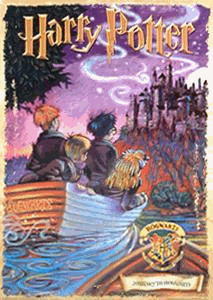 Evil
in the non-magical world
Evil
in the non-magical world
The character Harry Potter first encounters evil when he is only a baby, though he does not clearly remember this confrontation. Readers are thus forced to wait for much of the book for an explanation of Harry’s (and by extension the wizarding world’s) experience of what evil is. However, what readers are first shown in-depth is an encounter with the "regular" world—that is, the world of "muggles" or non-magical peoples.
Readers are first introduced to Vernon, Petunia and Dudley Dursley, who are the only family Harry Potter has. The Dursleys are "perfectly normal, thank you very much" (1). They are fiercely committed to maintaining this label of normal at all costs. This leads to their cruel treatment of Harry, as he is the only thing that could destroy their façade of normalcy once and for all. He is made to sleep in a dark, spider-infested cupboard, he is seldom given enough to eat and he is certainly never given any love or attention. This abuse stems from the fact that Harry’s parents were wizards, and the Dursleys do not (nor do they care to in the future) understand what this means. All Petunia Vernon knows is that one day her sister got a letter from a school for witches and wizards and everyone in the family was so proud. Petunia, on the other hand, saw that her sister as a freak. She and her husband have thus taken great care to stamp out Harry’s potential for the "dangerous nonsense" that killed his parents. In doing this, it is the Dursleys’ themselves who embody a kind of evil recognizable in humanity’s experience today. The Dursleys have taken from the past a memory of fear and internalized it to the point where it is "okay" to marginalize Harry because he is different. In Marjorie Hewitt Suchocki’s model, this is in fact evil in action. She would assert that human beings are responsible for the evil systems that have arisen in society and the perpetuation of such unjust systems.
 The
family life that the Dursleys give Harry is a microcosmic example of this idea.
As Suchocki says, the incorporation of the past "into the self can be named
an instance of demonic possession. The person so affected becomes a bearer of
the demonic toward others, perpetuating demonic power." Petunia Dursley
shared her fear of the "abnormal" with her husband and passed it on to
their sun Dudley. Dudley continues the cycle of abuse against Harry (and against
any who is weaker than he) because it is seen as a positive way of acting. Also,
had Harry gone on living with the Dursley’s until he was legally old enough to
be on his own, who knows where his life of abuse would have taken him. Suchocki’s
process model of evil is thus clear in Harry’s family life: Petunia
internalizes an imperfect system at work in society already (a fear of that
which is different or what one does not understand) by rejecting her sister. She
and her husband perpetuate this by passing this fear to Dudley, who becomes a
powerful figure against Harry within their peer group. Hence, if someone from
Harry’s own magical world hadn’t come to save him, his story might have been
like any abused child. He could have been appeared in Suchocki’s book as an
example of a person caught in a web of evil systems continuing ad perpetuam.
His story didn’t end this way, however, which makes the idea of evil in the
novel that much more complex.
The
family life that the Dursleys give Harry is a microcosmic example of this idea.
As Suchocki says, the incorporation of the past "into the self can be named
an instance of demonic possession. The person so affected becomes a bearer of
the demonic toward others, perpetuating demonic power." Petunia Dursley
shared her fear of the "abnormal" with her husband and passed it on to
their sun Dudley. Dudley continues the cycle of abuse against Harry (and against
any who is weaker than he) because it is seen as a positive way of acting. Also,
had Harry gone on living with the Dursley’s until he was legally old enough to
be on his own, who knows where his life of abuse would have taken him. Suchocki’s
process model of evil is thus clear in Harry’s family life: Petunia
internalizes an imperfect system at work in society already (a fear of that
which is different or what one does not understand) by rejecting her sister. She
and her husband perpetuate this by passing this fear to Dudley, who becomes a
powerful figure against Harry within their peer group. Hence, if someone from
Harry’s own magical world hadn’t come to save him, his story might have been
like any abused child. He could have been appeared in Suchocki’s book as an
example of a person caught in a web of evil systems continuing ad perpetuam.
His story didn’t end this way, however, which makes the idea of evil in the
novel that much more complex.
![]()
 To move through the
pages in order, click:
To move through the
pages in order, click:
Or go directly to the page you want:
Synopsis of the Harry Potter Stories
Good in Harry Potter as Defined by Biblical Texts